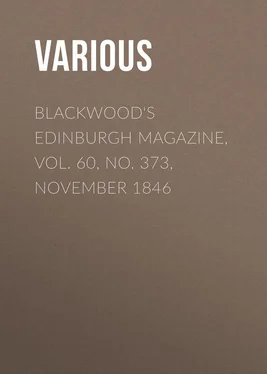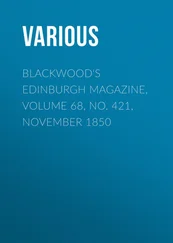Various - Blackwood's Edinburgh Magazine, Vol. 60, No. 373, November 1846
Здесь есть возможность читать онлайн «Various - Blackwood's Edinburgh Magazine, Vol. 60, No. 373, November 1846» — ознакомительный отрывок электронной книги совершенно бесплатно, а после прочтения отрывка купить полную версию. В некоторых случаях можно слушать аудио, скачать через торрент в формате fb2 и присутствует краткое содержание. Издательство: Иностранный паблик, Жанр: periodic, foreign_edu, Путешествия и география, на английском языке. Описание произведения, (предисловие) а так же отзывы посетителей доступны на портале библиотеки ЛибКат.
- Название:Blackwood's Edinburgh Magazine, Vol. 60, No. 373, November 1846
- Автор:
- Издательство:Иностранный паблик
- Жанр:
- Год:неизвестен
- ISBN:нет данных
- Рейтинг книги:5 / 5. Голосов: 1
-
Избранное:Добавить в избранное
- Отзывы:
-
Ваша оценка:
- 100
- 1
- 2
- 3
- 4
- 5
Blackwood's Edinburgh Magazine, Vol. 60, No. 373, November 1846: краткое содержание, описание и аннотация
Предлагаем к чтению аннотацию, описание, краткое содержание или предисловие (зависит от того, что написал сам автор книги «Blackwood's Edinburgh Magazine, Vol. 60, No. 373, November 1846»). Если вы не нашли необходимую информацию о книге — напишите в комментариях, мы постараемся отыскать её.
Blackwood's Edinburgh Magazine, Vol. 60, No. 373, November 1846 — читать онлайн ознакомительный отрывок
Ниже представлен текст книги, разбитый по страницам. Система сохранения места последней прочитанной страницы, позволяет с удобством читать онлайн бесплатно книгу «Blackwood's Edinburgh Magazine, Vol. 60, No. 373, November 1846», без необходимости каждый раз заново искать на чём Вы остановились. Поставьте закладку, и сможете в любой момент перейти на страницу, на которой закончили чтение.
Интервал:
Закладка:
The identity of their ideas, the similarity of their objects of ambition, appears in the monuments which both have left at Paris. Great as was the desire of the Emperor to add to its embellishment, magnificent as were his ideas in the attempt, he has yet been unable to equal the noble structures of the Bourbon dynasty. The splendid pile of Versailles, the glittering dome of the Invalides, still, after the lapse of a century and a half, overshadow all the other monuments in the metropolis; though the confiscations of the Revolution, and the victories of the Emperor, gave succeeding governments the resources of the half of Europe for their construction. The inscription on the arch of Louis, "Ludovico Magno," still seems to embody the gratitude of the citizens to the greatest benefactor of the capital; and it is not generally known that the two edifices which have added most since his time to the embellishment of the metropolis, and of which the revolution and the empire are fain to take the credit – the Pantheon and the Madeleine – were begun in 1764 by Louis XV., and owe their origin to the magnificent ideas which Louis XIV. transmitted to his, in other respects, unworthy descendant. 1 1 "La Madeleine comme le Pantheon avait été commencée la même année en 1764, par les ordres de Louis XV., le roi des grand monumens, et dont le regne a été travesti par la petite histoire." – Capefigue, Histoire de Louis Philippe , viii. 281.
Had one dark and atrocious transaction not taken place, the annalist might have stopped here, and painted the French monarch, with a few foibles and weaknesses, the common bequest of mortality, still as, upon the whole, a noble and magnanimous ruler. His ambition, great as it was, and desolating as it proved, both to the adjoining states, and in the end his own subjects, was the "last infirmity of noble minds." He shared it with Cæsar and Alexander, with Charlemagne and Napoleon. Even his cruel and unnecessary ravaging of the Palatinate, though attended with dreadful private suffering, has too many parallels in the annals of military cruelty. His personal vanities and weaknesses, his love of show, his passion for women, his extravagant expenses, were common to him with his grandfather Henry IV.; they seemed inherent in the Bourbon race, and are the frailties to which heroic minds in every age have been most subject. But, for the revocation of the Edict of Nantes, and the heartrending cruelties with which it was carried into execution, no such apology can be found. It admits neither of palliation nor excuse. But for the massacre of St Bartholomew, and the expulsion of the Morescoes from Spain, it would stand foremost in the annals of the world for kingly perfidy and priestly cruelty. The expulsion of five hundred thousand innocent human beings from their country, for no other cause but difference of religious opinion – the destruction, it is said, of nearly an hundred thousand by the frightful tortures of the wheel and the stake – the wholesale desolation of provinces and destruction of cities for conscience sake, never will and never should be forgotten. It is the eternal disgrace of the Roman Catholic religion – a disgrace to which the "execrations of ages have not yet affixed an adequate censure" – that all these infamous state crimes took their origin in the bigoted zeal, or sanguinary ambition of the Church of Rome. Nor have any of them passed without their just reward. The expulsion of the Moors, the most industrious and valuable inhabitants of the Peninsula, has entailed a weakness upon the Spanish monarchy, which the subsequent lapse of two centuries has been unable to repair. The reaction against the Romish atrocities produced the great league of which William III. was the head; it sharpened the swords of Eugene and Marlborough; it closed in mourning the reign of Louis XV. Nor did the national punishment stop here. The massacre of St Bartholomew, and revocation of the Edict of Nantes, were the remote, but certain cause of the French Revolution, and all the unutterable miseries which it brought both upon the Bourbon race and the professors of the Romish faith. Nations have no immortality; their punishment is inflicted in this world; it is visited with unerring certainty on the third and fourth generations. Providence has a certain way of dealing with the political sins of men – which is, to leave them to the consequences of their own actions.
If ever the characters of two important actors on the theatre of human affairs stood forth in striking and emphatic contrast to each other, they were those of Louis XIV. and William III. They were, in truth, the representatives of the principles for which they respectively so long contended; their characters embodied the doctrines, and were distinguished by the features, of the causes for which they fought through life. As much as the character – stately, magnanimous, and ambitious, but bigoted and unscrupulous – of Louis XIV. personified the Romish, did the firm and simple, but persevering and unconquerable mind of William, embody the principles of the Protestant faith. The positions they respectively held through life, the stations they occupied, the resources, moral and political, which they wielded, were not less characteristic of the causes of which they were severally the heads. Louis led on the feudal resources of the French monarchy. Inured to rigid discipline, directed by consummate talent, supported by immense resources, his armies, uniting the courage of feudal to the organisation of civilised times, like those of Cæsar, had at first only to appear to conquer. From his gorgeous palaces at Paris, he seemed able, like the Church of Rome from the halls of the Quirinal, to give law to the whole Christian world. William began the contest under very different circumstances. Sunk in obscure marshes, cooped up in a narrow territory, driven into a corner of Europe, the forces at his command appeared as nothing before the stupendous array of his adversary. He was the emblem of the Protestant faith, arising from small beginnings, springing from the energy of the middle classes, but destined to grow with ceaseless vigour, until it reached the gigantic strength of its awful antagonist.
The result soon proved the prodigious difference in the early resources of the parties. Down went tower and town before the apparition of Louis in his strength. The iron barriers of Flanders yielded almost without a struggle to his arms. The genius of Turenne and Vauban, the presence of Louis, proved for the time irresistible. The Rhine was crossed; a hundred thousand men appeared before the gates of Amsterdam. Dissension had paralysed its strength, terror all but mastered its resolution. England, influenced by French mistresses, or bought by French gold, held back, and ere long openly joined the oppressor, alike of its liberties and its religion. All seemed lost alike for the liberties of Europe and the Protestant faith. But William was not dismayed. He had a certain resource against subjugation left. In his own words, "he could die in the last ditch." He communicated his unconquerable spirit to his fainting fellow-citizens; he inspired them with the noble resolution to abandon their country rather than submit to the invaders, and "seek in a new hemisphere that liberty of which Europe had become unworthy." The generous effort was not made in vain. The Dutch rallied round a leader who was not wanting to himself in such a crisis. The dikes were cut; the labour of centuries was lost; the ocean resumed its sway over the fields reft from its domain. But the cause of freedom of religion was gained. The French armies recoiled from the watery waste, as those of Napoleon afterwards did from the flames of Moscow. Amsterdam was the limit of the conquests of Louis XIV. He there found the power which said, "Hitherto shalt thou come, and no further, and here shall thy proud waves be staid." Long, and often doubtful, was the contest; it was bequeathed to a succeeding generation and another reign. But from the invasion of Holland, the French arms and Romish domination permanently receded; and but for the desertion of the alliance by England, at the peace of Utrecht, they would have given law in the palace of the Grand Monarque, bridled the tyranny of Bossuet and Tellier, and permanently established the Protestant faith in nearly the half of Europe.
Читать дальшеИнтервал:
Закладка:
Похожие книги на «Blackwood's Edinburgh Magazine, Vol. 60, No. 373, November 1846»
Представляем Вашему вниманию похожие книги на «Blackwood's Edinburgh Magazine, Vol. 60, No. 373, November 1846» списком для выбора. Мы отобрали схожую по названию и смыслу литературу в надежде предоставить читателям больше вариантов отыскать новые, интересные, ещё непрочитанные произведения.
Обсуждение, отзывы о книге «Blackwood's Edinburgh Magazine, Vol. 60, No. 373, November 1846» и просто собственные мнения читателей. Оставьте ваши комментарии, напишите, что Вы думаете о произведении, его смысле или главных героях. Укажите что конкретно понравилось, а что нет, и почему Вы так считаете.












